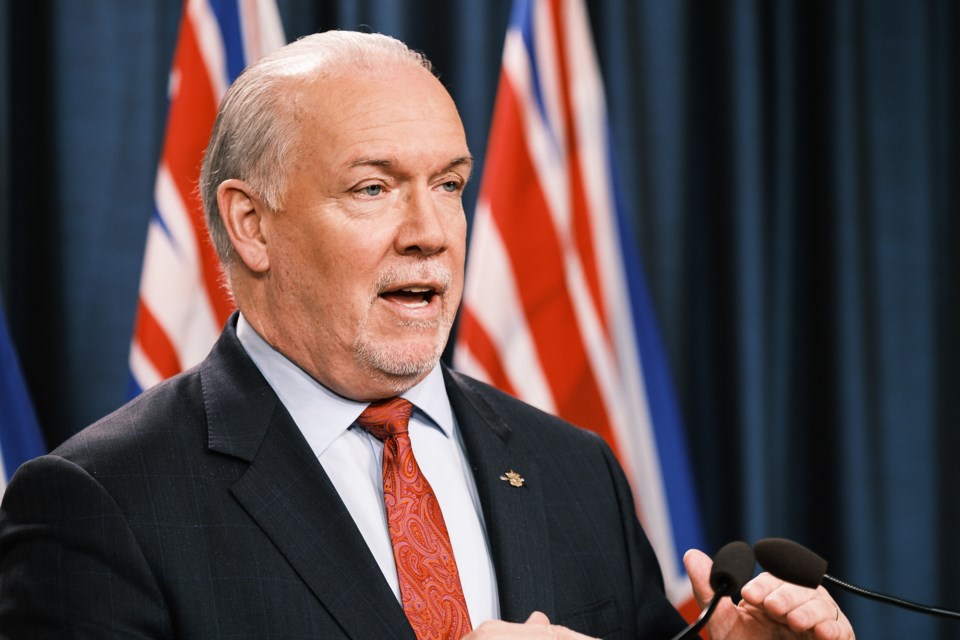John Horgan started his tenure as premier during the middle of a raging wildfire in 2017, and he hits his fourth year anniversary... in pretty much the same position.
The premier-designate took the stage at Government House on July 18, 2017 to swear in his cabinet, during the then-worst wildfire season in memory, and then-longest state of emergency in B.C.’s history.
Four years later, Horgan’s still stuck governing during crises, though they’ve only grown bigger.
There’s the COVID-19 pandemic, which has sideswiped the world since early 2020 and resulted in a record-breaking 16-month state of emergency for the province. And then there’s the 2021 wildfire season, which has started early and is making a strong play for the title of worst in provincial history.
All these crises have lurched the Horgan government off agenda on more than one occasion the past four years.
Yet, it has still accomplished much from its 2017 election platform, including reforms to the labour code, increases to disability and assistance programs, a hike to the minimum wage, a climate change plan and more.
Along the way, Horgan has taken great pains to make his modern progressive government more centrist - sticking with the Site C dam megaproject to generate clean hydroelectricity, courting the LNG Canada project to generate thousands of jobs and crafting an agenda around “affordability” in Metro Vancouver that continues to appeal to voters who otherwise in the past might never have considered themselves New Democrats.
He hits year four with an approval rating that’s the envy of most other premiers.
The question is: Now what?
The next four years look entirely different for the Horgan government, and they may in fact produce a premier that is far different from the one the public has come to know.
The biggest change is that October’s snap election majority victory freed the BC NDP from any further cooperation with the BC Greens. The party now has more than enough votes in the legislature to pass whatever it wants until 2025, without having to compromise and water down its initiatives like it did in the previous three years just to get the votes to keep its minority government alive.
This is a huge double-edged sword for New Democrats.
On the one hand, the party is finally unfettered in exercising its agenda in whatever way it wants, however it wants, as quickly (or slowly) as it wants. No consultation, no negotiation, no concessions.
On the other hand, it no longer has any moderating influence in the form of the BC Greens, which operated as a kind of check and balance to take the edge off what might otherwise have been far more aggressive traditional BC NDP initiatives.
What will this new unshackled premier and his government look like?
The first few months have been all COVID crisis management, leading into wildfire management, and potentially leading into another wave of COVID this fall.
But there will come a time soon when no more crises fill the agenda books of cabinet, and the government can turn its mind to more traditional governing under its new majority mandate.
Will it change how government operates, or its leadership style?
Will we see fewer “public consultations” that were launched on virtually every subject in the first term, in favour of more direct decision-making in the second?
Will the party veer more back into traditional labour-friendly policies, or continue its current centrist focus?
Nobody knows the answer to these questions - perhaps not even Horgan.
When you talk to him and current cabinet ministers you realize they are exhausted, having run on all cylinders now for the better part of two years from one crisis to another (also into an election of their own choice).
It won’t be until later this fall, and after a couple of weeks off in August, that we see the premier truly flex his majority mandate, and take his new government out for a spin to see what it’s capable of doing.
Rob Shaw has spent more than 13 years covering BC politics, now reporting for CHEK News and writing for The Orca. He is the co-author of the national best-selling book A Matter of Confidence, and a regular guest on CBC Radio.
SWIM ON:
- Rob Shaw: BC is the only province in Canada that hasn’t used a national cell phone alert system for emergencies. The reason why is frustrating.
- In May, Rob Shaw expected John Horgan to bring back a controversial bill from last summer, because it obviously means a lot to him, and also because he can.
- On Bill 22, John Horgan persisted in the face of near-universal condemnation. Rob Shaw asked why.



